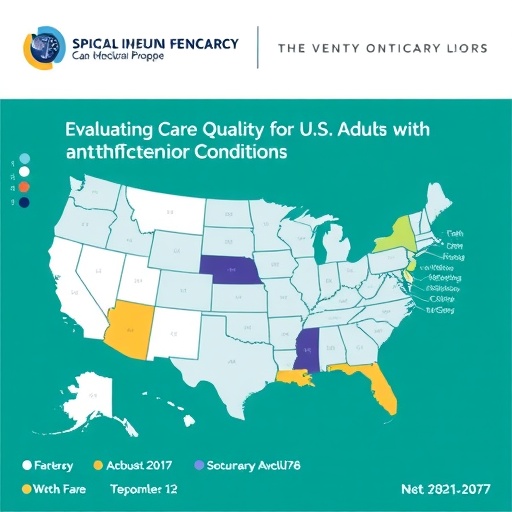Research has increasingly drawn attention to the challenges faced by individuals with multiple chronic conditions in the United States, particularly regarding access to healthcare and the perceived quality of care they receive. A comprehensive study, conducted by Wu, Sullivan, Perez, and their colleagues, utilizes data from the Medical Expenditure Panel Survey (MEPS) covering the years 2019 to 2021. This research addresses significant gaps in knowledge about the extent of healthcare access and the subjective experiences of patients dealing with various chronic health issues.
The population of adults with multiple chronic conditions has been on the rise, reflecting broader trends in aging and increasing prevalence of chronic diseases. Chronic conditions such as diabetes, hypertension, heart disease, and obesity often co-exist, complicating the healthcare landscape for millions of Americans. The implications of these complexities are profound, as individuals often find themselves navigating a fragmented healthcare system that can be difficult to traverse.
Understanding access to care is pivotal in assessing the effectiveness of healthcare systems. The study explores various dimensions of access, including availability of services, affordability, and geographical considerations. It examines whether individuals with multiple chronic conditions face barriers that impede their ability to receive timely and adequate care. The analysis reveals disparities across demographic groups, with marginalized populations frequently encountering more obstacles in accessing necessary healthcare services.
Quality of care is another critical component investigated by the researchers. While objective measures such as treatment adherence and clinical outcomes can provide insights, perceived quality is equally important. Patients’ opinions on their care can reflect underlying issues within the healthcare system. The study delves into factors that contribute to perceived quality, such as provider communication, responsiveness, and care coordination, all of which play a vital role in patient satisfaction and health outcomes.
The findings of this research are alarming, as they paint a picture of the reality faced by patients with multiple chronic conditions. Many report being dissatisfied with their care, highlighting gaps in communication with healthcare providers and a lack of tailored approaches to manage their complex health needs. These experiences can lead to detrimental outcomes, such as increased hospitalizations, poorer health status, and even premature mortality.
From a technical standpoint, the researchers employed sophisticated analytical methods to process the expansive MEPS dataset. They utilized multivariate regression models to account for various confounding factors, ensuring that the results reflect the true relationship between access, perceived quality, and chronic conditions. This rigorous approach bolsters the credibility of their findings and provides a robust framework for policymakers and healthcare providers to address identified issues.
The implications of the study extend beyond academic circles; they have the potential to influence healthcare policy and reform initiatives. Policymakers must recognize the urgency of the situation and implement strategies aimed at reducing barriers to care for those with multiple chronic conditions. Streamlining coordination among healthcare providers and enhancing patient-centered care practices are pivotal in improving overall access and quality.
Innovations in technology may offer solutions to some of these challenges. Telehealth, for instance, has emerged as a viable option for many patients, particularly during the COVID-19 pandemic. As this technology evolves, it presents opportunities for enhancing access to care, especially for individuals residing in rural or underserved areas. Expansion of telehealth services must be pursued alongside efforts to ensure that all patients have the necessary digital literacy and resources to benefit from these innovations.
Furthermore, the importance of cultural competence cannot be overstated. Healthcare providers must undergo training to understand the unique needs of patients from diverse backgrounds. This includes recognizing socioeconomic factors and tailoring interventions that consider the various stresses faced by individuals with chronic conditions. Enhancing cultural competence can result in better communication and improved relationships between patients and providers, ultimately leading to a higher quality of care.
In conclusion, the study by Wu, Sullivan, Perez, and colleagues underscores the urgent need to address the complex web of challenges faced by adults with multiple chronic conditions in the United States. By shedding light on access issues and perceived quality of care, this research lays the groundwork for necessary changes in the healthcare system. The focus must shift towards a more integrated and patient-centered approach, one that prioritizes the needs of individuals grappling with chronic health challenges.
Efforts to rectify the issues identified in the study will require concerted action from all stakeholders, including healthcare providers, policymakers, and community organizations. By working collaboratively, it is possible to bridge the gaps in access and quality of care, thereby improving the health and wellbeing of millions of Americans living with multiple chronic conditions. As this dialogue evolves, there lies great hope for reform that prioritizes an inclusive, equitable healthcare experience for all.
Ultimately, the insights gained from this groundbreaking research serve as a clarion call to action, highlighting that healthcare is not merely a privilege but a fundamental right that should be accessible to everyone, irrespective of their chronic conditions. The health system’s ability to meet the needs of its most vulnerable members will define the trajectory of healthcare in the United States for years to come.
Subject of Research: Access and Perceived Quality of Care in U.S. Adults with Multiple Chronic Conditions
Article Title: Access and Perceived Quality of Care in US Adults with Multiple Chronic Conditions: MEPS 2019–2021
Article References:
Wu, J., Sullivan, P.W., Perez, A. et al. Access and Perceived Quality of Care in US Adults with Multiple Chronic Conditions: MEPS 2019–2021. J GEN INTERN MED (2025). https://doi.org/10.1007/s11606-025-09896-7
Image Credits: AI Generated
DOI: 10.1007/s11606-025-09896-7
Keywords: healthcare access, quality of care, chronic conditions, healthcare policy, patient-centered care, telehealth, cultural competence, health disparities




